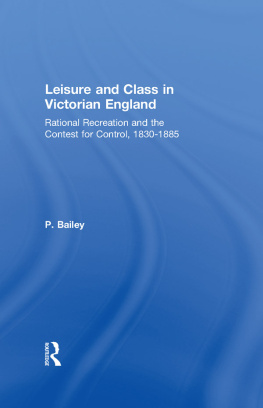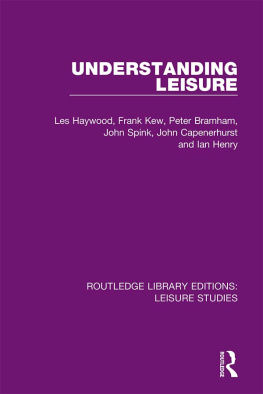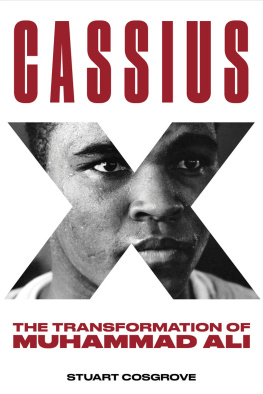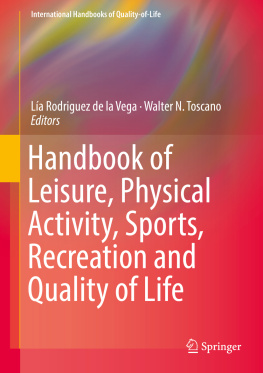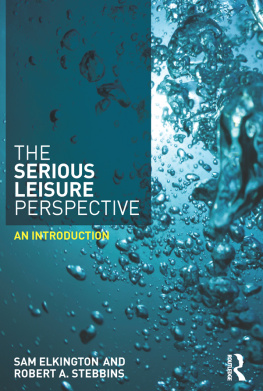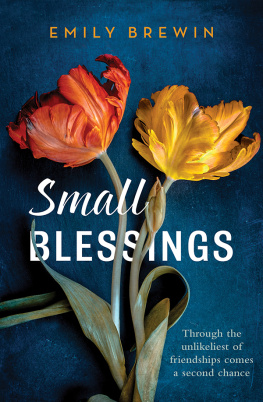ROUTLEDGE LIBRARY EDITIONS: HUMAN GEOGRAPHY
Volume 4
THE GEOGRAPHY OF RECREATION AND LEISURE
The Geography of Recreation and Leisure
Isobel Cosgrove and
Richard Jackson
First published in 1972 by Hutchinson & Co (Publishers) Ltd
This edition first published in 2016
by Routledge
2 Park Square, Milton Park, Abingdon, Oxon OX14 4RN
and by Routledge
711 Third Avenue, New York, NY 10017
Routledge is an imprint of the Taylor & Francis Group, an informa business
1972 Isobel Cosgrove and Richard Jackson
All rights reserved. No part of this book may be reprinted or reproduced or utilised in any form or by any electronic, mechanical, or other means, now known or hereafter invented, including photocopying and recording, or in any information storage or retrieval system, without permission in writing from the publishers.
Trademark notice: Product or corporate names may be trademarks or registered trademarks, and are used only for identification and explanation without intent to infringe.
British Library Cataloguing in Publication Data
A catalogue record for this book is available from the British Library
ISBN: 978-1-138-95340-6 (Set)
ISBN: 978-1-315-65887-2 (Set) (ebk)
ISBN: 978-1-138-96324-5 (Volume 4) (hbk)
ISBN: 978-1-315-65888-9 (Volume 4) (ebk)
Publisher's Note
The publisher has gone to great lengths to ensure the quality of this reprint but points out that some imperfections in the original copies may be apparent.
Disclaimer
The publisher has made every effort to trace copyright holders and would welcome correspondence from those they have been unable to trace.
THE GEOGRAPHY OF RE CREATION AND LEISURE
Isobel Cosgrove
&
Richard Jackson
HUTCHINSON UNIVERSITY LIBRARY
LONDON
HUTCHINSON & CO (Publishers) LTD
3 Fitzroy Square, London WI
London Melbourne Sydney Auckland
Wellington Johannesburg Cape Town
and agencies throughout the world
First published 1972
The paperback edition of this book is sold subject to the condition that it shall not, by way of trade or otherwise, be lent, re-sold, hired out or otherwise circulated without the pub lisher's prior consent, in any form of binding or cover other than that in which it is published and without a similar condition including this condition being imposed on the subsequent purchaser
lsobel Cosgrove and Richard Jackson 1972
This book has been set in Times type, printed in Great Britain on smooth wove paper by Anchor Press, and bound by Wm. Brendon, both of Tiptree, Essex
ISBN 0 09 110260 X (Cased)
ISBN 0 09 110261 8 (paper)
Contents
Our interests in the subject of this book were aroused by Professor E. W. Gilbert, Professor J. W. House and Neil Duncan; Professor Bryan Langlands has been most considerate during the writing of this book; Margaret Tinkler read and criticised parts of the draft; J. Mukasa mastered the intricacies of strange place-names during the typing of the manuscript; we would like to thank these people in particular amongst the many who have offered their advice and help. The Geographical Endowment Fund, Oxford, gave financial aid towards research done for
We have permission from Professor J. W. House, Department of Geography, University of Newcastle upon Tyne; the Department of Arts and Recreation for the Teesside County Borough, and from the City of Toronto Planning Board to reproduce maps. Also from Studio Vista to quote from Recreations by J. A. R. Pimlott; University of Adelaide, The Griffin Press from Mass Entertainment: The Origins of a Modern Industry by Asa Briggs, 1960; Indiana University Press, Bloomington, from the essay by G. Candilis in Environment and Policy, edited by W. Eward, 1967. Any errors in the text are, of course, directly attributable to the interference of Denis and Anne and our thanks are due to April Davies for helping us to avoid most such errors.
I.M.C.
R.T.J.
Introduction:
The Ideology of Leisure
The Greek ideal of schole, meaning leisure or contemplation, was enjoyed by an elite, while the work of the majority was defined only in terms of the minority ideal, and as a means to that end for society as a whole. The semantics of ascholia (work) show a dialectic philosophy; work being the means to the end, leisure, for the Greek nation. For the slaves, however, ascholia was an end in itself. But even at that time the citizens could see a stage when a large proportion of the population would have time free from the necessity to work. Aristotle predicted that 'the only one condition in which we can imagine managers not needing subordinates... would be that each instrument could do its own work, at the word of command or by intelligent anticipation like the Statues of Daedalus...' . This must be one of his more accurate statements about the future. In every society there has always been what could be described as a leisured elite. By definition, this group was dependent on the work of others for their survival; they could be called the parasites in society.
After the Reformation the misunderstood Puritan aftermath of the Lutheran and Calvinistic doctrines was based on an ethic of salvation through hard work. This became one of the fundamental and most revered values of the Protestant world, and eventually of newly emergent Capitalist society.very radically changed attitudes of its adherents towards work and leisure. Instead of work being a means of gaining time and money for leisure, it became a means to eternal salvation, and as such within the confines of human existence and experience, an end itself. Work was good. To be active and productive was to be seen to be working, and so to be seen to be aiming towards eternal life. Leisure was, therefore, superfluous, unnecessary, even bad, unless it could be seen as the means whereby one eventually became more productive; this kind of recreation was the new, acceptable form of leisure paternalistically offered to the Victorian worker.
Max Weber saw the Protestant world as being caught in an 'iron cage' showed how an industrial elite emerged in his society at the end of the nineteenth century. They earned their leisure not through the accumulation of land, as in the Middle Ages, nor through war and colonisation, as in Greece and Rome, but through the acceptable Protestant means of asceticism, restraint and hard work. Because of this, their leisure time was surrounded by a new and very different set of ideals and values. Finding themselves caught in the Weberian 'iron cage' in which to be productive was to be respectable and respected, they were faced with the dilemma of spending their time and money earned in an equally acceptable way. They had to reconcile leisure, which is by their definition unproductive, with the need to be seen to be productive. Veblen's 'Leisure Class' achieved a certain degree of resolution by using leisure time to display their worth, wealth, power and status in society.
They indulged in patterns of conspicuous consumption and conspicuous leisure; a way of life immortalised and criticised by Orson Welles in his film Citizen Kane. This elite used inactivity to advertise the extent of their forefathers' activity and productivity. Their extravagant and extrovert tastes and patterns of behaviour were not a means of escape from the cage but simply a way of being at leisure and at the same time indicating that they were staying firmly inside it. The relevance of this elite to contemporary society is that their canons of taste have been largely adopted by a new leisured majority: the twentieth-century middle class. Despite a generally lower level of commitment to work, an increased preoccupation with consumption, there is no real evidence available to prove that the present leisured class find abundance any easier to live with than Veblen's elite did seventy years ago. The hedonistic values of the Greeks were based on an entirely different code of ethics from those which underlie the growing search for leisure and pleasure in the late twentieth century.





